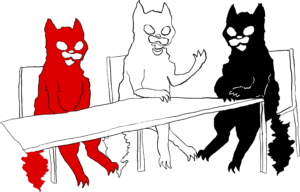The Industrial Workers of the World (IWW) are seeking submissions for our new publication: Wobbly Times. The theme of the first issue is ‘Workers of the World Unite!’. The Editorial Circle for Wobbly Times welcomes submissions that engage with the theme. We would like essays, articles, opinion pieces, poems, short stories, drawings and other artwork on the theme of ‘Workers of the World Unite!’.
Since its founding in 1905, the IWW has set out to build ‘One Big Union’ that unites workers within each employment sector, (i.e. each Industry), and across all employment sectors. As a Union we have engaged in workplace struggles for better wages and conditions, but our ultimate aim has been a revolutionary one, the abolition of the wage system itself. Contributors to the first issue may wish to critically reflect on attempts to create ‘One Big Union’ and attempts to abolish the wage system, in recent years and throughout history. Some of the questions contributors may want to engage with are: how can workers’ unity best be achieved today, in a context where smaller workplaces and a more diverse and fragmented workforce is increasingly the norm in Europe and North America? What organisational forms are required to achieve workers’ unity in the twenty-first century? What philosophical principles are required to achieve the abolition of the wage system in the twenty-first century? How do we make creative use of the tensions between Industrial organising (IUs) and local organising (Regional and Branch)?
Although the IWW was founded in the United States of America, it was deliberately named the Industrial Workers of the World, not the Industrial Workers of America. From its origins the IWW has had aspirations to be an international union and the international appeal of the IWW as a form of Union organisation can be seen in the spread of the Union to countries all over the globe. Contributors to the first issue may wish to reflect on the international dimensions of workers’ struggles. Questions that contributors may wish to consider include: how do we best provide international solidarity for workers’ struggles across the globe? What forms of worker solidarity with Palestinians has the IWW engaged in since the beginning of the war on Gaza, and/or historically? What does membership of the International Confederation of Labour-Confederación International del Trabajo (ICL-CIT) involve?
We are living through times of significant social divisions between workers all over the world. Nativist sentiment is driving anti-immigrant protests in many countries around the world. Far-right parties are enjoying levels of electoral support not seen since the 1970s, or in some places not seen since the 1930s. A majority of workers reject the anti-immigrant, transphobic, misogynist, war-mongering, nationalistic rhetoric and policies of these far-right parties. A concerning number of workers, however, are being drawn towards these anti-working-class ideas and the organisations that spout them. The Editorial Circle would like to hear from workers who want to write something about what ‘Workers of the World Unite!’ means in this context. Questions you might want to engage with include: What, if any implications, does the rise of nativist activity have for workplace organising? How should workers organise to oppose these divisive sentiments?

The IWW is sometimes described as an anarchist Union. The founding members of the IWW, and many of its members over the years, however, have included not just anarchists but also Marxists and other socialists. The IWW is sometimes described as a syndicalist Union, (and sometimes as anarcho-syndicalist), but some of the founding members of the IWW were involved in electoral politics. Is the IWW a form of organisation that can unite revolutionary workers across these different, sometimes rival, traditions? Or, is the IWW inherently anarchist and/or syndicalist? If the IWW is inherently anarchist and/or syndicalist, what are the implications of this for workers’ unity?
One of the reasons the IWW are trying to unite workers is to bring about the abolition of the wage system. But it is worth asking, what happens after that? And does how we organise now have implications for a post-capitalist society? What does workers’ control of production mean in a post-capitalist society, and do we need to bear that in mind when thinking about how we organise now?
The suggestions above are not meant to be prescriptive. They are offered as a stimulus to thinking. The Editorial Circle are open to any submissions that engage with the theme of “Workers of the World Unite!”.
Deadline for Submissions: May 30, 2025
If you are interested in contributing to the thematic issue ‘Workers of the World Unite!’ (on the writing or production side), please contact the IWW Literature Committee at: literature@iww.org.uk



